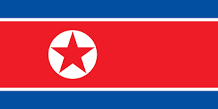North Korea, a nation often shrouded in mystery and controversy, stands as a unique entity in the realm of global geopolitics. Its military power, though frequently debated and analyzed, remains a subject of immense intrigue and concern for the international community. Let's delve into the enigmatic world of North Korea's military prowess, its significance, and the implications it holds for regional and global stability.
The Arsenal: Military Capabilities
At the heart of North Korea's military strength lies its Korean People's Army (KPA), one of the largest standing militaries in the world. Comprising an estimated 1.2 million active-duty personnel and several million more in reserve, the KPA stands as a formidable force ready to defend the regime at all costs. Its structure encompasses ground forces, air and naval components, as well as specialized units dedicated to cyber warfare and unconventional tactics.
North Korea's pursuit of nuclear weapons and ballistic missile technology has been a focal point of international concern. Despite facing severe economic sanctions and diplomatic isolation, the regime has persistently advanced its nuclear program, conducting multiple nuclear tests and steadily enhancing its missile capabilities. The development of intercontinental ballistic missiles (ICBMs) capable of reaching targets as far as the continental United States has elevated North Korea to a significant player in the global nuclear landscape.
Strategic Importance
The military strength of North Korea holds immense strategic importance, both regionally and globally, for several reasons:
Deterrence and Regime Survival: For the North Korean leadership, a robust military serves as a vital tool for deterrence against perceived external threats. The regime's survival hinges on maintaining a credible defense posture, thus ensuring the loyalty of the military establishment and projecting strength domestically and internationally.
Regional Stability: The Korean Peninsula remains one of the most volatile regions in the world, with longstanding tensions between North and South Korea, exacerbated by the presence of U.S. forces in the South. North Korea's military capabilities directly influence the security dynamics of Northeast Asia, impacting neighboring countries such as South Korea, Japan, China, and Russia.
Global Diplomacy: North Korea's nuclear program has granted it significant leverage in diplomatic negotiations with major world powers. The regime's ability to threaten regional stability and potentially target distant adversaries with nuclear weapons has forced the international community to engage in dialogue and pursue diplomatic solutions to mitigate the risk of conflict.
Asymmetric Warfare: Beyond conventional military capabilities, North Korea possesses a formidable arsenal of asymmetric warfare tools, including cyber warfare and covert operations. These capabilities present unconventional challenges to adversaries, enabling the regime to exert influence and disrupt operations on a global scale.
Challenges and Consequences
Despite its military might, North Korea faces numerous challenges that could undermine its strategic objectives and stability:
Economic Constraints: The regime's relentless pursuit of military advancements comes at a steep cost, exacerbating the country's economic woes and perpetuating the cycle of poverty and deprivation for its citizens. Economic sanctions imposed by the international community further strain North Korea's resources, limiting its capacity for sustained military expansion.
Technological Limitations: While North Korea has made significant strides in developing nuclear and missile capabilities, its military remains constrained by technological deficiencies and reliance on outdated equipment. The sustainability and reliability of its nuclear arsenal, as well as the effectiveness of its missile systems, remain subject to scrutiny and uncertainty.
International Isolation: The regime's belligerent rhetoric, coupled with its provocative actions, has led to widespread condemnation and diplomatic isolation. Efforts to engage diplomatically and denuclearize the Korean Peninsula have been met with mixed results, as North Korea often uses its military capabilities as a bargaining chip while remaining reluctant to relinquish its nuclear arsenal entirely.
Humanitarian Concerns: The prioritization of military spending over social welfare has perpetuated human rights abuses and exacerbated humanitarian crises within North Korea. The regime's oppressive policies, including forced labor camps and political repression, continue to draw condemnation from the international community and raise ethical concerns about the true cost of its military ambitions.
The military power of North Korea represents a complex interplay of strategic imperatives, geopolitical dynamics, and humanitarian concerns. While the regime's pursuit of military advancements has granted it significant influence and deterrence capabilities, it also poses profound challenges and risks for regional and global stability. As the international community grapples with the enduring enigma of North Korea, the path toward peaceful resolution remains elusive, underscoring the urgent need for sustained dialogue, diplomacy, and cooperation to address the underlying tensions and achieve lasting peace on the Korean Peninsula.




